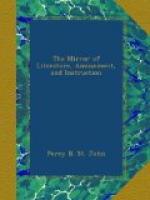[4] The remains of Major Andre
were lately, by a special request
from
the British government to the United States, brought
to
England,
and placed among the worthies of Westminster Abbey.
* * * * *
THE LETTER-BELL.
By the late William Hazlitt.
Complaints are frequently made of the vanity and shortness of human life, when, if we examine its smallest details, they present a world by themselves. The most trifling objects, retraced with the eye of memory, assume the vividness, the delicacy, and importance of insects seen through a magnifying glass. There is no end of the brilliancy or the variety. The habitual feeling of the love of life may be compared to “one entire and perfect chrysolite,” which, if analyzed, breaks into a thousand shining fragments. Ask the sum-total of the value of human life, and we are puzzled with the length of the account, and the multiplicity of items in it: take any one of them apart, and it is wonderful what matter for reflection will be found in it! As I write this, the Letter-Bell passes: it has a lively, pleasant sound with it, and not only fills the street with its importunate clamour, but rings clear through the length of many half-forgotten years. It strikes upon the ear, it vibrates to the brain, it wakes me from the dream of time, it flings me back upon my first entrance into life, the period of my first coming up to town, when all around was strange, uncertain, adverse—a hub-bub of confused noises, a chaos of shifting objects—and when this sound alone, startling me with the recollection of a letter I had to send to the friends I had lately left, brought me as it were to myself, made me feel that I had links still connecting me with the universe, and gave me hope and patience to persevere. At that loud tinkling, interrupted sound (now and then,) the long line of blue hills near the place where I was brought up waves in the horizon, a golden sunset hovers over them, the dwarf-oaks rustle their red leaves in the evening breeze, and the road from —— to ——, by which I first set out on my journey through life, stares me in the face as plain, but from time and change not less visionary and mysterious, than the pictures in the Pilgrim’s Progress. I should notice, that at this time the light of the French Revolution circled my head like a glory, though dabbled with drops of crimson gore: I walked confident and cheerful by its side—
“And by the vision splendid
Was on my way attended.”
It rose then in the east: it has again risen in the west. Two suns in one day, two triumphs of liberty in one age, is a miracle which I hope the laureate will hail in appropriate verse. Or may not Mr. Wordsworth give a different turn to the fine passage, beginning—
“What, though the radiance which
was once so bright,
Be now for ever vanished from my sight;
Though nothing can bring back the hour
Of glory in the grass, of splendour in
the flower?”




